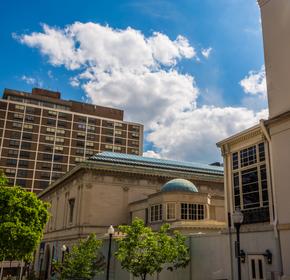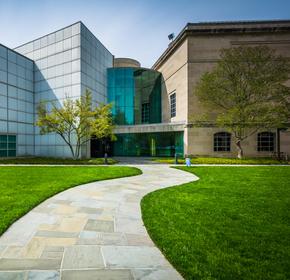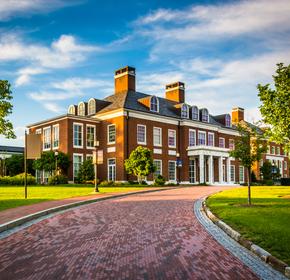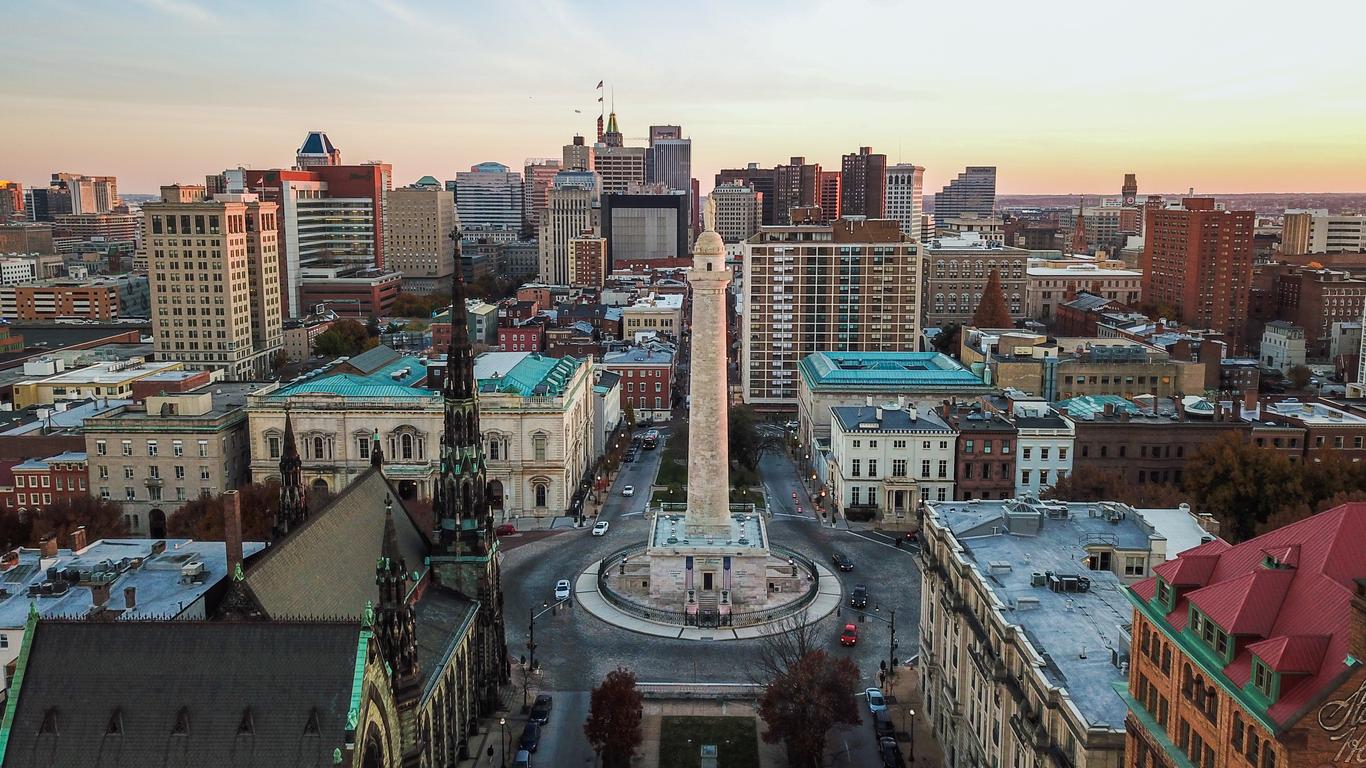
Baltimore travel guide
Baltimore Tourism | Baltimore Guide
You're Going to Love Baltimore
Baltimore is often neglected by tourists in favor of the East Coast's other great tourist cities, but this is a big mistake. If you head to this charming, vibrant city, you'll instantly see why.
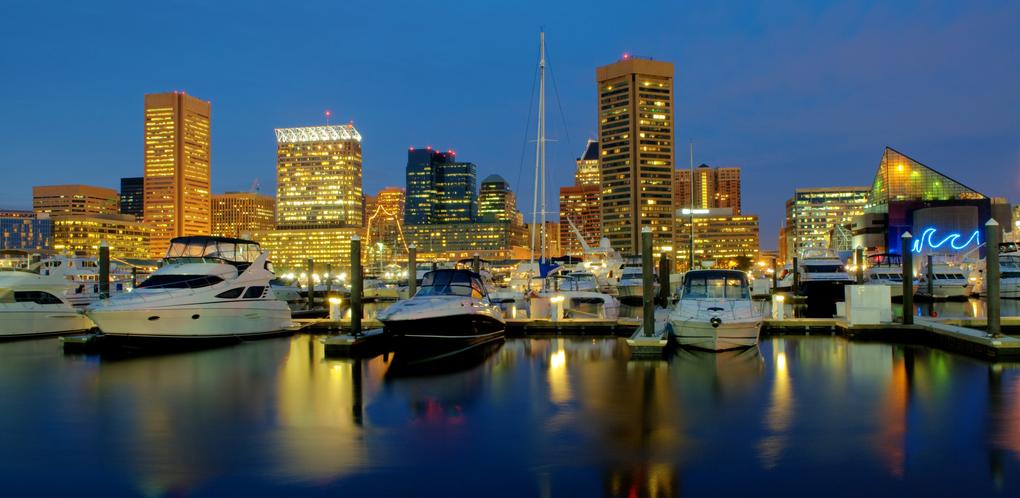
For a start, you'll smell the irresistible aroma of freshly cooked crabcakes or coddies. Baltimore does seafood like no other American city, and its local specialities are not to be missed.
Alternatively, it could be the unique atmosphere of the city. When you head to an Orioles match or tour the stalls at Lexington Market, you'll feel like a native wherever you go.
There are also centuries of history to explore, not to mention museums, galleries and music venues. It all makes Baltimore an exceptional tourist destination, and one that nobody should overlook.
Top 5 Reasons to Visit Baltimore
The Harbor
Baltimore's harbor area is beautiful and packed with things to do. Kids can enjoy the Aquarium and the Science Center, while everyone can enjoy the chance to board historic ships like the USS Constellation.
The Wire
If you've been thrilled by the HBO series The Wire, why not visit where the action took place? Professional guides give three and a half hour tours of where major scenes were filmed, providing a unique insight into where creator David Simon drew his inspiration.
Seafood
If you love crabcakes, cod fishcakes, and trout, Baltimore is the only place to go. Nowhere on the eastern seaboard makes seafood dishes like Baltimore institutions do. Check out Faidley Seafood or Pierpoint Restaurant for some of the best.
Sports
Whether you love NFL or Major League Baseball, Baltimore is a great sporting city. Check out the Orioles at Camden Yards or the Ravens at the M&T Bank Stadium. The atmosphere will be intense whichever option you choose.
History
Baltimore is one of America's oldest cities, and it's seen a lot of action over the past 250 years. The city was attacked by the British in 1812, became the hub of one of the world's first passenger railways in the 1840s, and pioneered women's rights in the 1890s. Now, it's full of historic sites like the Westminster Burying Ground (home to Edgar Allen Poe's grave), Fort McHenry and City Hall.
What to do in Baltimore
1. The Walters Art Museum: An Artistic Treasure Trove
The Walters Art Museum, a public art museum inaugurated in 1934, features more than 22,000 19th-century works bestowed by William Thompson Walters and his son Henry Walters. The collection includes ancient Egyptian, Greek and Roman masterworks, as well as paintings by European masters. You'll also find Chinese ceramics and bronzes, Art Deco jewelry by René Lalique, the House of Fabergé and Tiffany and Co. and early items from the Near East, Mesopotamian and Middle East.
2. American Visionary Art Museum: For More Alternative Art
The American Visionary Art Museum focuses on outsider art, also known as intuitive art, raw art or art brut. Congress has designated the space, which includes over 4,000 pieces, the national self-taught art museum. The permanent collection features works by Howard Finster, Ho Baron, Nek Chand, Vanessa German, Ted Gordon, Vollis Simpson and Judith Scott among others. The museum also showcases 40 items from the Cabaret Mechanical Theatre of London.
3. Fort McHenry: An Important American Landmark
Fort McHenry, a coastal star-shaped fort used in the War of 1812, was built in 1798. Designated a National Monument and Historic Shrine in 1939, the fort features a replica of the 15-star/15-stripe U.S. flag. Francis Scott Key wrote the Star Spangled Banner at the fort following a bomb raid by the British in 1814. The national landmark, which holds a 4th of July celebration complete with cannon firings and a performance by the Guard Fife and Drum Corps, can be accessed by Water Taxi from Baltimore's Inner Harbor.
4. Baltimore Museum of Art: For the True Master Works
The Baltimore Museum of Art, founded in 1914, houses an international art collection with 95,000 pieces ranging from ancient Antioch mosaics to avant-garde modern art. Highlights include masterpieces by Matisse, Picasso, Gauguin, van Gogh, Cézanne, Manet, Degas, Giambattista Pittoni and Renoir. Gertrude's Restaurant, famous for its crab imperial, single-fry oysters, rockfish, pan-fried chicken, corn fritters and crab soup, is owned by chef John Shields and located within the museum.
5. Fells Point Historic Area: Maritime Fun
Fell's Point, on the Baltimore waterfront neighborhood, was founded in 1763. A vibrant area with antique shops, restaurants, coffee bars, music stores and more than 120 pubs, the area adjoins the city's business district and the Jones Falls stream. The historic home of Irish, German, Polish and East European immigrants can be reached by Water Taxi. Listed on the National Register of Historic Districts, Fell's Point hosts the Privateer Festival, a Halloween Celebration and an Olde-Tyme Christmas Festival.
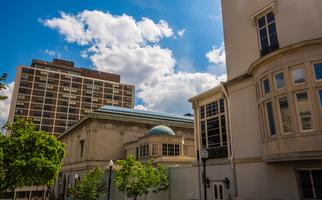
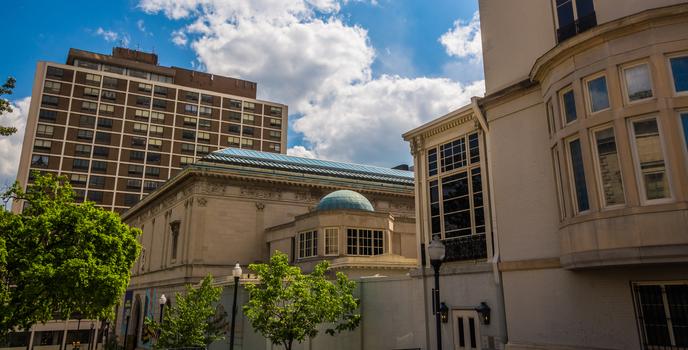
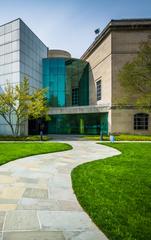
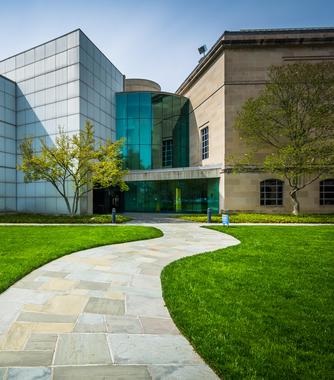
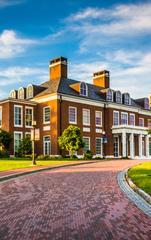
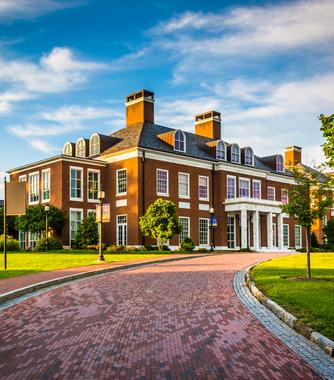
1. The Walters Art Museum: An Artistic Treasure Trove
The Walters Art Museum, a public art museum inaugurated in 1934, features more than 22,000 19th-century works bestowed by William Thompson Walters and his son Henry Walters. The collection includes ancient Egyptian, Greek and Roman masterworks, as well as paintings by European masters. You'll also find Chinese ceramics and bronzes, Art Deco jewelry by René Lalique, the House of Fabergé and Tiffany and Co. and early items from the Near East, Mesopotamian and Middle East.
2. American Visionary Art Museum: For More Alternative Art
The American Visionary Art Museum focuses on outsider art, also known as intuitive art, raw art or art brut. Congress has designated the space, which includes over 4,000 pieces, the national self-taught art museum. The permanent collection features works by Howard Finster, Ho Baron, Nek Chand, Vanessa German, Ted Gordon, Vollis Simpson and Judith Scott among others. The museum also showcases 40 items from the Cabaret Mechanical Theatre of London.
3. Fort McHenry: An Important American Landmark
Fort McHenry, a coastal star-shaped fort used in the War of 1812, was built in 1798. Designated a National Monument and Historic Shrine in 1939, the fort features a replica of the 15-star/15-stripe U.S. flag. Francis Scott Key wrote the Star Spangled Banner at the fort following a bomb raid by the British in 1814. The national landmark, which holds a 4th of July celebration complete with cannon firings and a performance by the Guard Fife and Drum Corps, can be accessed by Water Taxi from Baltimore's Inner Harbor.
4. Baltimore Museum of Art: For the True Master Works
The Baltimore Museum of Art, founded in 1914, houses an international art collection with 95,000 pieces ranging from ancient Antioch mosaics to avant-garde modern art. Highlights include masterpieces by Matisse, Picasso, Gauguin, van Gogh, Cézanne, Manet, Degas, Giambattista Pittoni and Renoir. Gertrude's Restaurant, famous for its crab imperial, single-fry oysters, rockfish, pan-fried chicken, corn fritters and crab soup, is owned by chef John Shields and located within the museum.
5. Fells Point Historic Area: Maritime Fun
Fell's Point, on the Baltimore waterfront neighborhood, was founded in 1763. A vibrant area with antique shops, restaurants, coffee bars, music stores and more than 120 pubs, the area adjoins the city's business district and the Jones Falls stream. The historic home of Irish, German, Polish and East European immigrants can be reached by Water Taxi. Listed on the National Register of Historic Districts, Fell's Point hosts the Privateer Festival, a Halloween Celebration and an Olde-Tyme Christmas Festival.






Where to Eat in Baltimore
Eating is one of Baltimore's greatest highlights, particularly if you love seafood. The city is famed for its steamed crabs, and great places to try them includes Faidley's Seafood, next to Lexington Market and Riptide by the Bay. Pit beef sandwiches are an alternative for meat lovers, and you can find great examples at Chaps Pit Beef and Bo Brooks. Cod fishcakes (coddies) are another specialty, and the best in town are served at Attman's Delicatessen. Expect to pay around $15 for a mid-range meal and $30 or more at a higher-end restaurant.
When to visit Baltimore
Baltimore can be very cold in winter and wet in spring and autumn, making summer the best time to go. Between late May and early September, the city is warm, and the cultural calendar kicks off. Art fans should be there in July for the Artscape festival, while August sees Druid Hill Park stage the popular StoneSoul Picnic event, featuring leading local hip hop and soul acts.
How to Get to Baltimore
Plane
The closest airport to the city is Baltimore-Washington International Airport, just a few miles out of town. If you fly into Baltimore-Washington and intend to rent a car, be aware that you'll need to catch a special shuttle bus to the dedicated car rental facility (outlets aren't located in the arrivals terminal as at other airports). There's also a light rail connection into the Downtown area, which costs just $2.
Train
Baltimore's Pennsylvania Station is on a number of Amtrak routes, including the Cardinal (from Chicago to New York via Washington), the Crescent (from New York to New Orleans) and the Palmetto (from New York to Savannah, Georgia). This means you should be able to get there from most eastern cities via rail. The MARC regional rail network also links Baltimore with Washington D.C.
Car
If you are coming from Philadelphia or New York, I-95 is the road to take, and the same road also connects Baltimore with cities in the south such as Atlanta, Richmond, and Miami. I-81 links the city with destinations in the south and west, including New Orleans and Nashville.
Bus
Buses are a convenient way to get to Baltimore from a host of eastern cities. Greyhound is the major operator in the city, with a large station in the Inner Harbor district. However, there are also intercity services provided by Bolt Bus, Apex (exclusively to New York), MVP Bus (to Washington and New York) and Megabus (to many regional cities).
Airports near Baltimore
Airlines serving Baltimore
Where to stay in Baltimore
Inner Harbor – The Inner Harbor is the tourist center of Baltimore and home to attractions like the city's collection of historic ships, the National Aquarium (which houses over 750 different aquatic species) and the Baltimore Convention Center - home to various comic conventions and other events throughout the year. Head to Harbor East for the best food options and don't miss Little Havana, a great Cuban restaurant with delicious food and even better cocktails.
Popular Neighborhoods in Baltimore
Downtown Baltimore – The business center of the city still has plenty of appeal for tourists. It's home to some of the city's performing arts spaces, including the Hippodrome Theater and the indie venue Sonar Baltimore. It's also where you'll find Lexington Market, the best place in the city to eat street food like gyros, pizza and burritos.
Midtown – The creative center of the city Midtown is a relaxed, safe and attractive place to stay. It contains the town's oldest neighborhoods, such as Mount Vernon along with the Station North Arts District, home to the best theaters, music venues like the Lyric Opera House and Joseph Meyerhoff Symphony Hall. It's a great place to eat as well, thanks to street food joints like Sofi's Crepes and Iggie's Pizza.
Where to stay in popular areas of Baltimore
Most booked hotels in Baltimore
How to Get Around Baltimore
Public Transportation
Public transit in Baltimore is provided by the Maryland Transit Authority (MTA) and isn't particularly reliable or extensive. At $4 for a daily pass, it isn't that expensive, though, and there are some handy light rail and bus routes. For example, you might want to park your car at Camden Yards and take the train from there, avoiding the need for expensive city center parking. There are also a couple of inner-city bus routes known as the Charm City Circulator. These are free of charge and are really useful for skipping between the Inner Harbor, Downtown and areas like Fells Point.
Taxis
Taxis are a convenient and affordable way to get around Baltimore. Most companies have a meter drop of $1.80, then around $2.40 for each mile after that. Uber can work out much cheaper, with a basic rate of $1 and then $1.15 per mile. if you get the chance, check out the water taxis in the harbor area as well (which cost $9 for a day pass).
Car
Driving in Baltimore shouldn't pose too many problems, and unlike many major cities, finding parking spots isn't usually difficult. However, the price of parking can be high in the very center of town, so think about parking outside the center and commuting in if you need to save money.
Best car hire deals in Baltimore
Standard
5 Adults, 3 Bags
AED 160/day
Compact
4 Adults, 2 Bags
AED 160/day
The Cost of Living in Baltimore
Shopping Streets
Baltimore has some fantastic areas to shop, with a wide range of craft stores, boutiques and international brands to visit. There are standard malls like Arundel Mills, where the stores include Disney, H&M, and Old Navy. Closer to the center of town, the Gallery Mall at Harborplace features plenty of major chains like Banana Republic and Forever 21, while if you want arts and crafts products, head to Midtown outlets like Utrecht Art Supplies and Beadazzled.
Groceries and Other
Easily the most fun place to shop for groceries in Baltimore is Lexington Market. Established way back in 1782, Lexington Market sells a huge array of fruit and vegetables, preserves, seafood, and meat. However, for more standard groceries, head to supermarkets like Harvest Fare Save-a-Lot and Whole Foods, which can be found all across the city. Prices aren't too high. Expect to pay $3.80 for a gallon of milk and $2.80 for 12 eggs.
